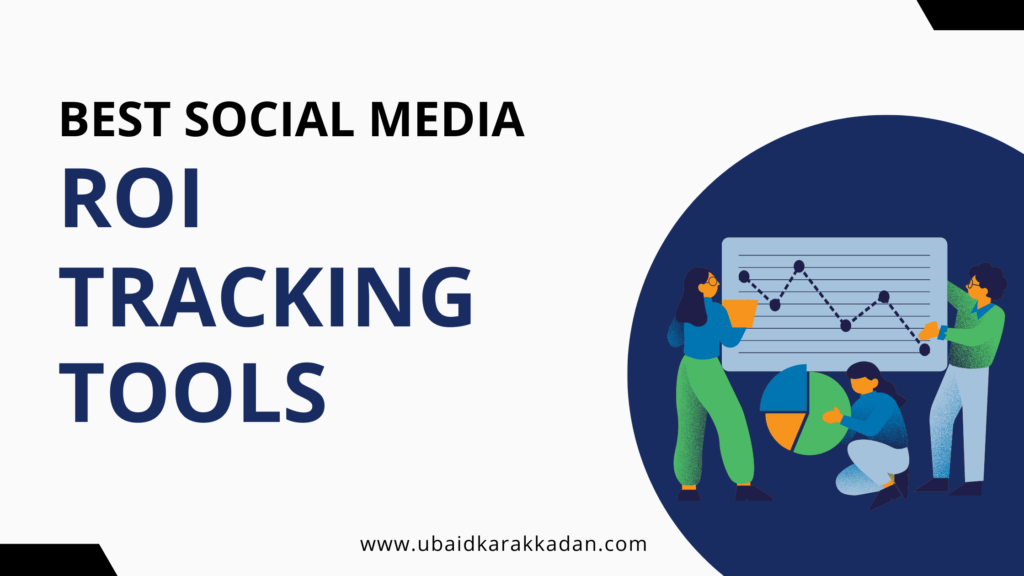
In today’s digital landscape, social media has become an indispensable platform for businesses to connect with their audience, build brand awareness, and drive conversions. However, measuring the return on investment (ROI) from social media efforts can be a complex task. That’s where social media ROI tracking tools come into play.
In this blog post, we will explore the importance of tracking social media ROI and how it can significantly impact your marketing strategies. We’ll delve into the benefits of utilizing social media ROI tracking tools, which streamline the data collection and analysis process, providing accurate insights into your campaign performance.
Additionally, we will showcase some of the top-rated social media ROI tracking tools available in the market today. These tools offer a range of features, benefits, and pricing options to suit various business needs.
Furthermore, we will discuss the key features to consider when selecting a social media ROI tracking tool and provide tips on implementing these tools effectively. Real-life case studies will demonstrate the success stories of businesses that have leveraged these tools to optimize their social media ROI.
So, if you’re looking to enhance your social media marketing efforts and achieve better ROI, this guide will equip you with the knowledge and tools necessary to track, measure, and optimize your social media ROI. Let’s dive in and discover how social media ROI tracking tools can propel your business towards success.
Table of Contents
II. What is Social Media ROI Tracking?
In the realm of social media marketing, understanding and tracking Return on Investment (ROI) is crucial for businesses. Social media ROI refers to the measurement and evaluation of the value generated from social media activities and campaigns. It allows businesses to determine the effectiveness and profitability of their social media efforts.
A. Definition of social media ROI
Social media ROI represents the tangible and intangible returns that a business receives from its social media investments. It encompasses a wide range of outcomes, including increased brand awareness, customer engagement, lead generation, conversions, and revenue. It quantifies the value generated from social media activities, enabling businesses to assess the effectiveness of their strategies and allocate resources wisely.
B. Importance of tracking ROI in social media marketing
Tracking ROI in social media marketing is vital for several reasons. Firstly, it helps businesses measure the success of their social media campaigns and initiatives. By understanding the ROI, you can identify which strategies are delivering the best results and optimize future campaigns accordingly. It also enables you to allocate resources effectively, focusing on tactics that generate the highest returns.
Additionally, tracking ROI provides insights into the impact of social media efforts on the bottom line. It helps in justifying social media marketing budgets, gaining support from stakeholders, and demonstrating the value of social media in contributing to overall business objectives.
C. Key metrics and indicators for measuring social media ROI
To measure social media ROI effectively, it is crucial to identify and track key metrics and indicators. Some common metrics include:
- Conversions: The number of desired actions taken by users, such as purchases, sign-ups, or downloads, as a result of social media efforts.
- Click-through Rate (CTR): The percentage of users who click on a link or call-to-action in a social media post or ad.
- Engagement: The level of interaction users have with your social media content, such as likes, comments, shares, and retweets.
- Reach: The number of unique users who have seen your social media content.
- Customer Lifetime Value (CLV): The predicted revenue a customer will generate over their lifetime as a result of social media interactions.
By tracking these metrics and analyzing the data, businesses can gain insights into their social media ROI and make data-driven decisions to optimize their strategies.
In conclusion, understanding social media ROI and tracking it diligently is essential for businesses. It allows you to measure the impact of your social media efforts, allocate resources effectively, and justify your social media marketing budgets. By identifying and tracking key metrics, you can gain valuable insights into the effectiveness of your social media campaigns and optimize your strategies for better results.
III. Benefits of Using Social Media ROI Tracking Tools
Social media ROI tracking tools offer numerous advantages for businesses aiming to measure and optimize their social media marketing efforts. Let’s explore some key benefits that come with using these tools:
A. Streamlined data collection and analysis
One of the primary advantages of social media ROI tracking tools is their ability to streamline the process of data collection and analysis. These tools gather data from various social media platforms, consolidate it in one central location, and provide comprehensive reports and visualizations. This saves businesses valuable time and effort that would otherwise be spent manually collecting and organizing data from multiple sources.
B. Accurate measurement of campaign performanc
With social media ROI tracking tools, businesses can accurately measure the performance of their social media campaigns. These tools provide in-depth analytics, allowing you to assess the reach, engagement, conversions, and other relevant metrics of your campaigns. By gaining accurate insights into campaign performance, you can identify strengths and weaknesses, make data-driven adjustments, and improve your return on investment.
C. Identification of ROI-driving strategies and tactics
Social media ROI tracking tools enable businesses to identify the strategies and tactics that drive the highest return on investment. By analyzing the data provided by these tools, you can uncover patterns and trends that indicate successful approaches. This knowledge empowers you to replicate and refine those strategies, maximizing the impact of your social media efforts and ensuring that your resources are allocated wisely.
D. Time and cost savings in reporting and analysis
Another significant benefit of using social media ROI tracking tools is the time and cost savings they offer in reporting and analysis. These tools automate the process of generating reports, eliminating the need for manual data compilation and formatting. With the ability to create customized reports quickly, businesses can dedicate more time to analyzing the data and deriving actionable insights. Additionally, by streamlining reporting processes, these tools reduce the associated costs, making social media ROI tracking more efficient and cost-effective.
In summary, social media ROI tracking tools provide several key benefits for businesses. They streamline data collection and analysis, ensuring accurate measurement of campaign performance. These tools also help in identifying ROI-driving strategies and tactics, enabling businesses to optimize their social media marketing efforts. Lastly, they save time and costs in reporting and analysis, freeing up resources for more in-depth analysis and strategy refinement. By leveraging these benefits, businesses can enhance their social media ROI and drive better results from their marketing efforts.
Also read: Conversion Rate Optimization: Strategies You Can Apply
IV. Top Social Media ROI Tracking Tools
When it comes to tracking social media ROI, having the right tools at your disposal can make all the difference. In this section, we will explore three top-notch social media ROI tracking tools that have garnered positive reviews from users. Let’s dive in and discover their features, benefits, and pricing options:
Here are some of the most popular social media ROI tracking tools:
- Google Analytics is a free tool that can be used to track traffic from social media to your website. It also provides data on engagement, conversions, and other metrics.
- Sprout Social is a paid tool that provides a dashboard for tracking social media metrics, including engagement, reach, and ROI. It also offers insights and reports to help you improve your social media strategy.
- Hootsuite is another paid tool that offers a dashboard for tracking social media metrics. It also provides tools for scheduling posts, managing multiple accounts, and collaborating with team members.
- Buffer is a paid tool that helps you schedule social media posts and track their performance. It also offers analytics on engagement, reach, and ROI.
- Klout is a paid tool that measures your social media influence. It can be used to track your ROI by measuring the impact of your social media activity on brand awareness, traffic, and conversions.
These are just a few of the many social media ROI tracking tools available. The best tool for you will depend on your specific needs and budget.
Here are some additional factors to consider when choosing a social media ROI tracking tool:
- The metrics you want to track. Not all tools track the same metrics, so make sure to choose one that tracks the metrics that are important to you.
- The level of detail you need. Some tools provide more detailed reports than others. If you need to track your ROI down to the penny, you’ll need a tool that provides more detailed reports.
- Your budget. Social media ROI tracking tools can range in price from free to hundreds of dollars per month. Choose a tool that fits your budget and your needs.
V. Key Features to Consider in Social Media ROI Tracking Tools
When evaluating social media ROI tracking tools, it’s important to consider the key features that can enhance your tracking and analysis capabilities. Here are some essential features to look for:
A. Integration with social media platforms
The ability of a tool to integrate seamlessly with various social media platforms is crucial. Look for tools that support integration with popular platforms such as Facebook, Instagram, Twitter, LinkedIn, and others. This allows for automatic data collection and retrieval, saving you time and effort in manual data entry.
B. Customizable reporting and visualization capabilities
Effective reporting and visualization are essential for understanding your social media ROI. Seek tools that offer customizable reporting options, allowing you to tailor reports to your specific needs. Look for features like drag-and-drop report builders, pre-built templates, and the ability to export reports in various formats for easy sharing and presentation.
C. Advanced analytics and attribution modeling
To gain deep insights into your social media ROI, opt for tools that offer advanced analytics capabilities. Look for features such as attribution modeling, which helps attribute conversions and sales to specific social media campaigns or channels. Advanced analytics also enable you to track key metrics like engagement rates, reach, click-through rates, and customer acquisition costs.
D. Real-time monitoring and alerts
Real-time monitoring is crucial for identifying and responding to trends, mentions, and opportunities as they happen. Look for tools that provide real-time monitoring and alerts for keywords, hashtags, brand mentions, and competitor activities. This allows you to stay informed and take timely action to optimize your social media strategies.
E. Collaboration and team management features
If you work in a team or collaborate with others on social media campaigns, consider tools that offer collaboration and team management features. Look for features like user permissions, task assignment, shared calendars, and communication tools. These features streamline collaboration, improve workflow efficiency, and ensure smooth coordination among team members.
By considering these key features, you can select a social media ROI tracking tool that aligns with your business needs and empowers you to measure and optimize your social media efforts effectively.
In conclusion, when choosing a social media ROI tracking tool, focus on features like seamless integration with social media platforms, customizable reporting and visualization capabilities, advanced analytics and attribution modeling, real-time monitoring and alerts, as well as collaboration and team management features. Assess your requirements, prioritize the features that are most important to your business, and select a tool that best suits your needs. With the right tool in hand, you can track and analyze your social media ROI with confidence, make data-driven decisions, and achieve better results from your social media marketing efforts.
VI. How to Implement Social Media ROI Tracking Tools
Now that we have explored the key features to consider in social media ROI tracking tools, let’s discuss how to effectively implement these tools in your social media marketing strategies. Follow these steps to make the most out of your chosen tool:
1.Set Clear Goals and Objectives:
Define your social media marketing goals and objectives. Are you looking to increase brand awareness, drive website traffic, generate leads, or boost conversions? Establishing clear goals will help you align your tracking efforts with your desired outcomes.
2.Identify Relevant KPIs and Metrics:
Determine the key performance indicators (KPIs) and metrics that align with your goals. These could include metrics like conversion rates, engagement rates, click-through rates, and revenue generated. Choose metrics that are meaningful and directly contribute to measuring your social media ROI.
3.Configure Tracking Parameters and Tags:
Depending on the tool you have selected, configure the necessary tracking parameters and tags. This might involve setting up UTM parameters for tracking URLs, implementing tracking pixels, or integrating social media APIs. Ensure that the tracking is set up correctly to capture accurate data.
4.Establish Data Collection and Analysis Processes:
Define processes for collecting and analyzing data using your chosen tool. Determine how frequently you will collect data and who will be responsible for managing the data collection process. Create a standardized approach to ensure consistency and accuracy in data collection.
5. Regularly Monitor and Adjust Campaigns Based on ROI Insights:
Continuously monitor your social media campaigns and assess their performance based on the insights provided by your ROI tracking tool. Identify trends, patterns, and opportunities to optimize your campaigns. Make data-driven adjustments to improve ROI and maximize the effectiveness of your social media efforts.
6. Seek Training and Support:
Familiarize yourself with the features and functionalities of your chosen tool. Take advantage of training resources, tutorials, and support documentation provided by the tool’s vendor. This will enable you to leverage the full potential of the tool and make the most out of its capabilities.
7. Stay Updated with Industry Trends and New Features:
Keep an eye on industry trends and updates related to social media ROI tracking. Stay informed about new features and advancements in tracking tools. This will help you stay ahead of the curve and leverage the latest innovations to enhance your tracking and analysis capabilities.
By following these implementation steps, you can effectively integrate your chosen social media ROI tracking tool into your marketing strategies. Remember, successful implementation requires alignment with your goals, meticulous data collection and analysis, continuous monitoring and adjustment, and staying up-to-date with the latest industry trends. With the right approach, you can unlock valuable insights and optimize your social media ROI effectively.
VII. Tips for Maximizing Social Media ROI with Tracking Tools
Maximizing social media ROI requires more than just implementing tracking tools. It involves leveraging the insights provided by these tools to optimize your campaigns and strategies. Here are some essential tips to help you make the most out of your social media ROI tracking tools:
A. Conduct Thorough Data Analysis and Benchmarking
To maximize your social media ROI, it’s crucial to conduct thorough data analysis. Dive deep into the metrics provided by your tracking tool to identify trends, patterns, and areas of improvement. Compare your performance against industry benchmarks and past campaign results. This analysis will help you gain valuable insights and identify opportunities for optimization.
B. Continuously Test and Optimize Campaigns Based on ROI Insights
Testing and optimization are key components of maximizing social media ROI. Utilize the insights provided by your tracking tools to experiment with different campaign elements such as ad copy, visuals, targeting, and calls-to-action. A/B testing can help you identify what works best for your audience and fine-tune your campaigns accordingly. Continuously monitor performance and make data-driven adjustments to optimize your ROI.
C. Leverage Audience Segmentation for Personalized Targeting
Audience segmentation is a powerful strategy for driving better results from your social media campaigns. Use the data collected through your tracking tools to segment your audience based on demographics, interests, behaviors, or past interactions. This enables you to create personalized content and targeted campaigns that resonate with specific audience segments. By delivering relevant and tailored messages, you can enhance engagement and increase your ROI.
D. Use ROI Tracking to Inform Content Creation and Messaging Strategies
Your tracking tools can provide valuable insights into the performance of your social media content and messaging. Analyze the data to understand which types of content drive the highest engagement, conversions, or ROI. Leverage this information to inform your content creation strategies. Tailor your content to align with what your audience responds to, experiment with different formats and messaging, and optimize your content strategy based on ROI insights.
In conclusion, maximizing social media ROI with tracking tools requires a strategic approach. By conducting thorough data analysis, continuously testing and optimizing campaigns, leveraging audience segmentation, and using ROI tracking to inform content creation and messaging strategies, you can enhance your social media ROI and drive better results. Remember, social media ROI is a dynamic process that requires ongoing monitoring, analysis, and adjustment. With the right strategies and insights from your tracking tools, you can unlock the full potential of your social media marketing efforts and achieve maximum ROI.
IX. Conclusion
In today’s digital landscape, social media has become a powerful platform for businesses to connect with their audience and drive results. However, without proper tracking and analysis, it can be challenging to measure the return on investment (ROI) from your social media efforts. That’s where social media ROI tracking tools come into play. Throughout this blog post, we have explored the importance of tracking social media ROI and how these tools can significantly impact your marketing strategies.
Recap of the importance of social media ROI tracking:
Tracking social media ROI is essential for several reasons. It allows businesses to measure the success of their social media campaigns, justify marketing budgets, and demonstrate the value of social media in contributing to overall business objectives. By understanding the ROI, businesses can make data-driven decisions, optimize their strategies, and allocate resources effectively.
Key benefits of using social media ROI tracking tools:
Social media ROI tracking tools offer a range of benefits that streamline the tracking and analysis process. These tools provide streamlined data collection and analysis, accurate measurement of campaign performance, identification of ROI-driving strategies, and time and cost savings in reporting and analysis. They empower businesses with valuable insights to optimize their social media efforts and drive better results.
Encouragement to explore and adopt these tools for maximizing social media ROI:
If you haven’t already, it’s time to explore and adopt social media ROI tracking tools for your business. These tools can unlock a wealth of information that will help you understand the effectiveness of your social media campaigns, identify areas for improvement, and make data-driven decisions to maximize your ROI. With the right tool in hand, you can track and measure the impact of your social media marketing efforts and optimize your strategies for better results.
In conclusion, social media ROI tracking is a vital component of successful social media marketing. It allows businesses to gauge the effectiveness of their campaigns, optimize their strategies, and allocate resources wisely. By leveraging social media ROI tracking tools, you can gain valuable insights into your performance, drive better results, and achieve maximum ROI from your social media efforts. Don’t hesitate to explore and adopt these tools to unlock the full potential of your social media marketing strategies.





